Leadership and Management in Unilever's Operations: A Report
VerifiedAdded on 2020/12/24
|12
|3647
|324
Report
AI Summary
This report provides a comprehensive analysis of management and operations within Unilever, a UK-based transitional consumer goods company. It begins by defining management and operations, then delves into the roles and characteristics of leaders and managers, highlighting their distinct responsibilities. The report explores the roles of leaders and managers in various situational contexts, such as interpersonal conflicts, labor turnover, and ineffective communication. It then examines different leadership theories and models, including situational, system, and contingency leadership, and how these approaches can be applied within Unilever. The report also covers key approaches to operation management and the roles of leaders and managers within this context, as well as the importance and values of operations management. Finally, it assesses factors impacting operational management and decision-making, using the PESTEL analysis. The report offers valuable insights into Unilever's operational strategies and leadership styles, providing a detailed overview of its management practices.
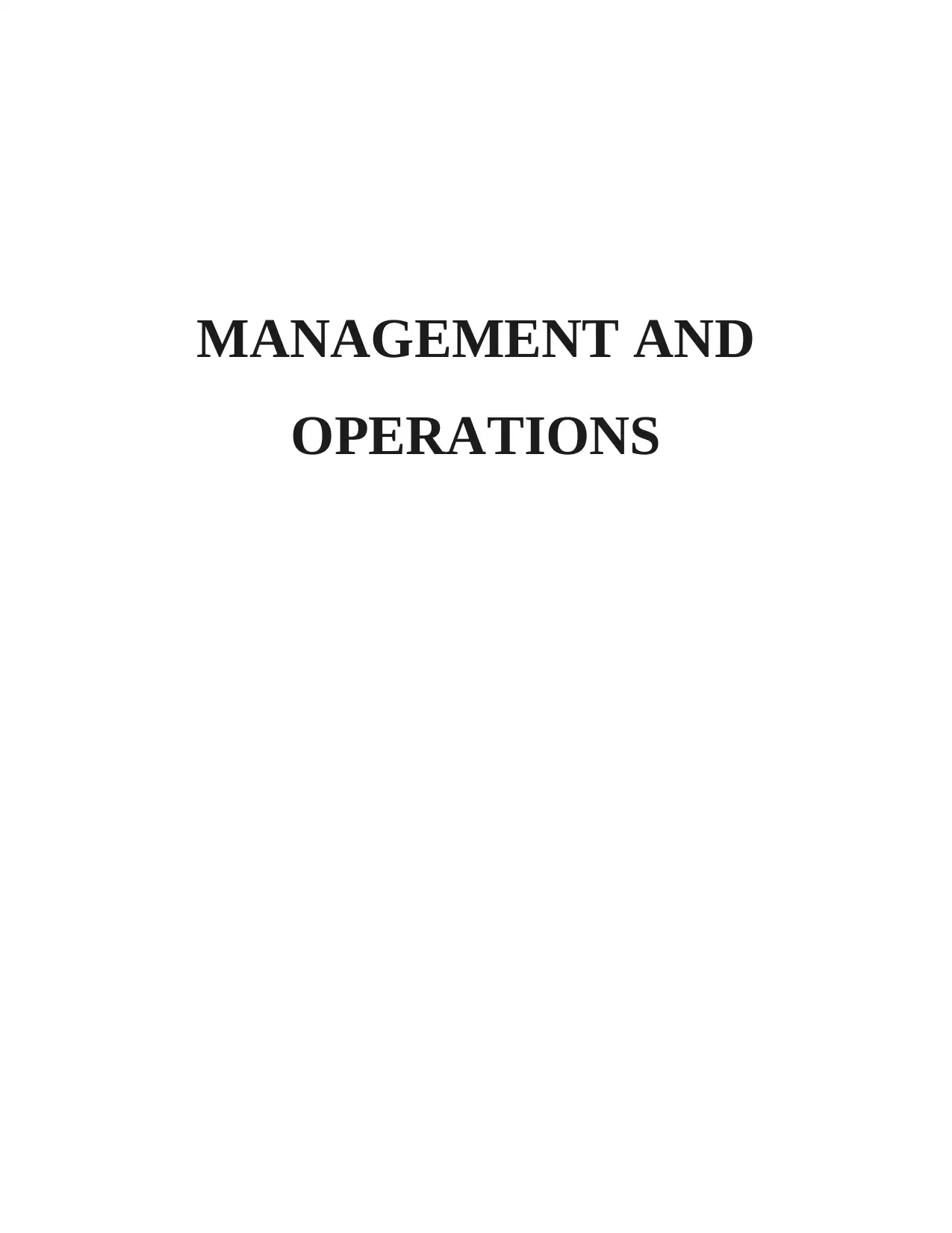
MANAGEMENT AND
OPERATIONS
OPERATIONS
Paraphrase This Document
Need a fresh take? Get an instant paraphrase of this document with our AI Paraphraser
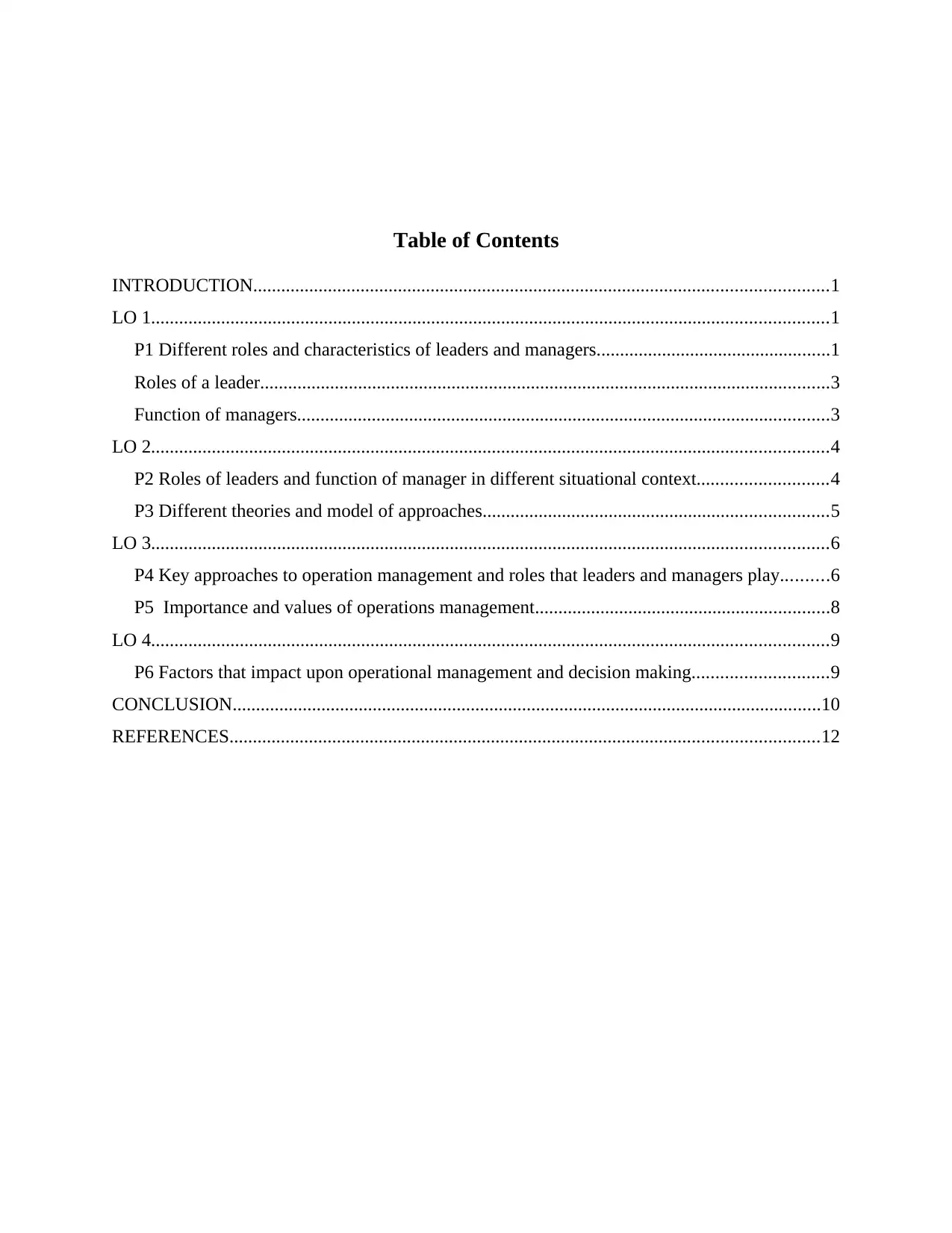
Table of Contents
INTRODUCTION...........................................................................................................................1
LO 1.................................................................................................................................................1
P1 Different roles and characteristics of leaders and managers..................................................1
Roles of a leader..........................................................................................................................3
Function of managers..................................................................................................................3
LO 2.................................................................................................................................................4
P2 Roles of leaders and function of manager in different situational context............................4
P3 Different theories and model of approaches..........................................................................5
LO 3.................................................................................................................................................6
P4 Key approaches to operation management and roles that leaders and managers play..........6
P5 Importance and values of operations management...............................................................8
LO 4.................................................................................................................................................9
P6 Factors that impact upon operational management and decision making.............................9
CONCLUSION..............................................................................................................................10
REFERENCES..............................................................................................................................12
INTRODUCTION...........................................................................................................................1
LO 1.................................................................................................................................................1
P1 Different roles and characteristics of leaders and managers..................................................1
Roles of a leader..........................................................................................................................3
Function of managers..................................................................................................................3
LO 2.................................................................................................................................................4
P2 Roles of leaders and function of manager in different situational context............................4
P3 Different theories and model of approaches..........................................................................5
LO 3.................................................................................................................................................6
P4 Key approaches to operation management and roles that leaders and managers play..........6
P5 Importance and values of operations management...............................................................8
LO 4.................................................................................................................................................9
P6 Factors that impact upon operational management and decision making.............................9
CONCLUSION..............................................................................................................................10
REFERENCES..............................................................................................................................12
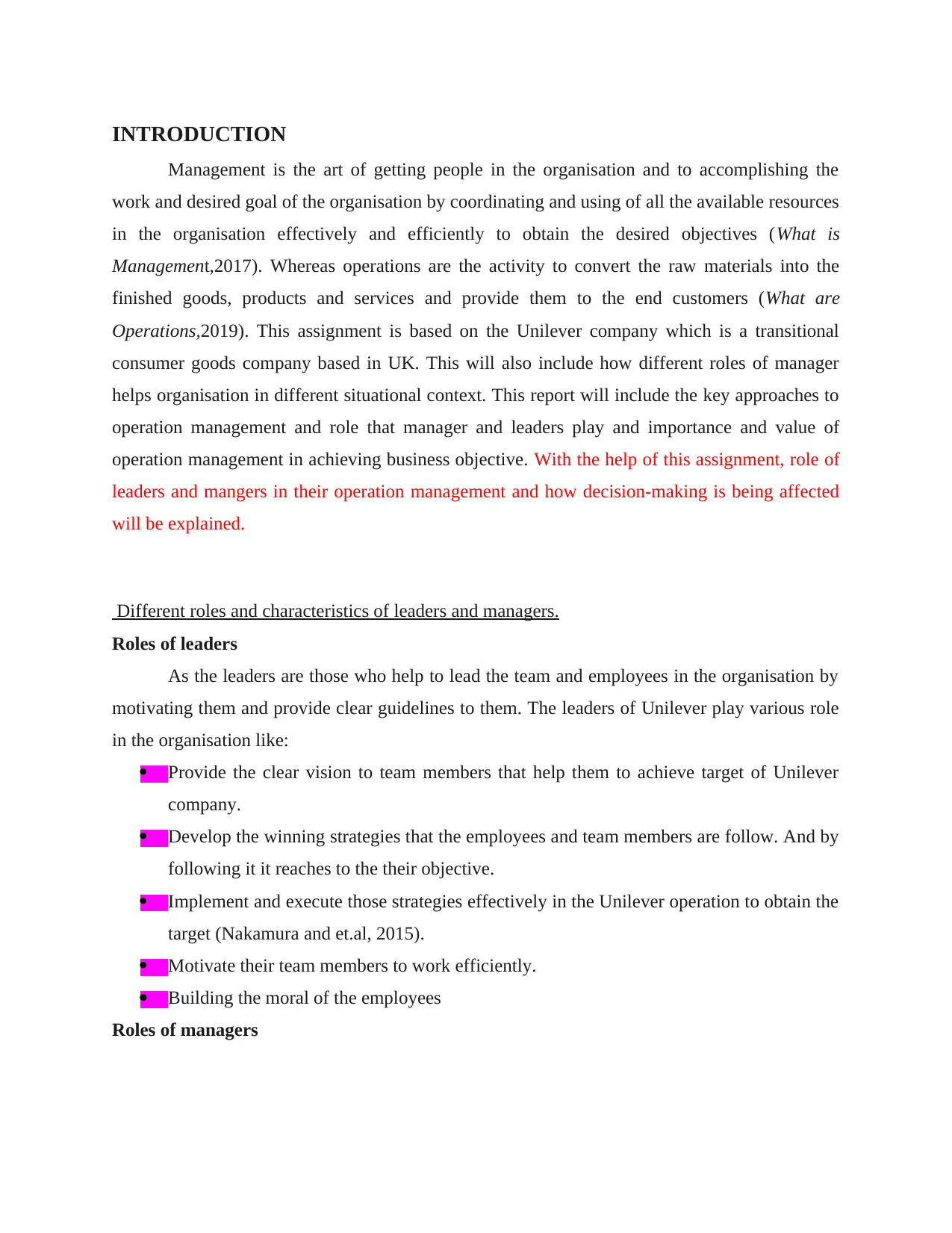
INTRODUCTION
Management is the art of getting people in the organisation and to accomplishing the
work and desired goal of the organisation by coordinating and using of all the available resources
in the organisation effectively and efficiently to obtain the desired objectives (What is
Management,2017). Whereas operations are the activity to convert the raw materials into the
finished goods, products and services and provide them to the end customers (What are
Operations,2019). This assignment is based on the Unilever company which is a transitional
consumer goods company based in UK. This will also include how different roles of manager
helps organisation in different situational context. This report will include the key approaches to
operation management and role that manager and leaders play and importance and value of
operation management in achieving business objective. With the help of this assignment, role of
leaders and mangers in their operation management and how decision-making is being affected
will be explained.
Different roles and characteristics of leaders and managers.
Roles of leaders
As the leaders are those who help to lead the team and employees in the organisation by
motivating them and provide clear guidelines to them. The leaders of Unilever play various role
in the organisation like:
Provide the clear vision to team members that help them to achieve target of Unilever
company.
Develop the winning strategies that the employees and team members are follow. And by
following it it reaches to the their objective.
Implement and execute those strategies effectively in the Unilever operation to obtain the
target (Nakamura and et.al, 2015).
Motivate their team members to work efficiently.
Building the moral of the employees
Roles of managers
Management is the art of getting people in the organisation and to accomplishing the
work and desired goal of the organisation by coordinating and using of all the available resources
in the organisation effectively and efficiently to obtain the desired objectives (What is
Management,2017). Whereas operations are the activity to convert the raw materials into the
finished goods, products and services and provide them to the end customers (What are
Operations,2019). This assignment is based on the Unilever company which is a transitional
consumer goods company based in UK. This will also include how different roles of manager
helps organisation in different situational context. This report will include the key approaches to
operation management and role that manager and leaders play and importance and value of
operation management in achieving business objective. With the help of this assignment, role of
leaders and mangers in their operation management and how decision-making is being affected
will be explained.
Different roles and characteristics of leaders and managers.
Roles of leaders
As the leaders are those who help to lead the team and employees in the organisation by
motivating them and provide clear guidelines to them. The leaders of Unilever play various role
in the organisation like:
Provide the clear vision to team members that help them to achieve target of Unilever
company.
Develop the winning strategies that the employees and team members are follow. And by
following it it reaches to the their objective.
Implement and execute those strategies effectively in the Unilever operation to obtain the
target (Nakamura and et.al, 2015).
Motivate their team members to work efficiently.
Building the moral of the employees
Roles of managers
⊘ This is a preview!⊘
Do you want full access?
Subscribe today to unlock all pages.

Trusted by 1+ million students worldwide
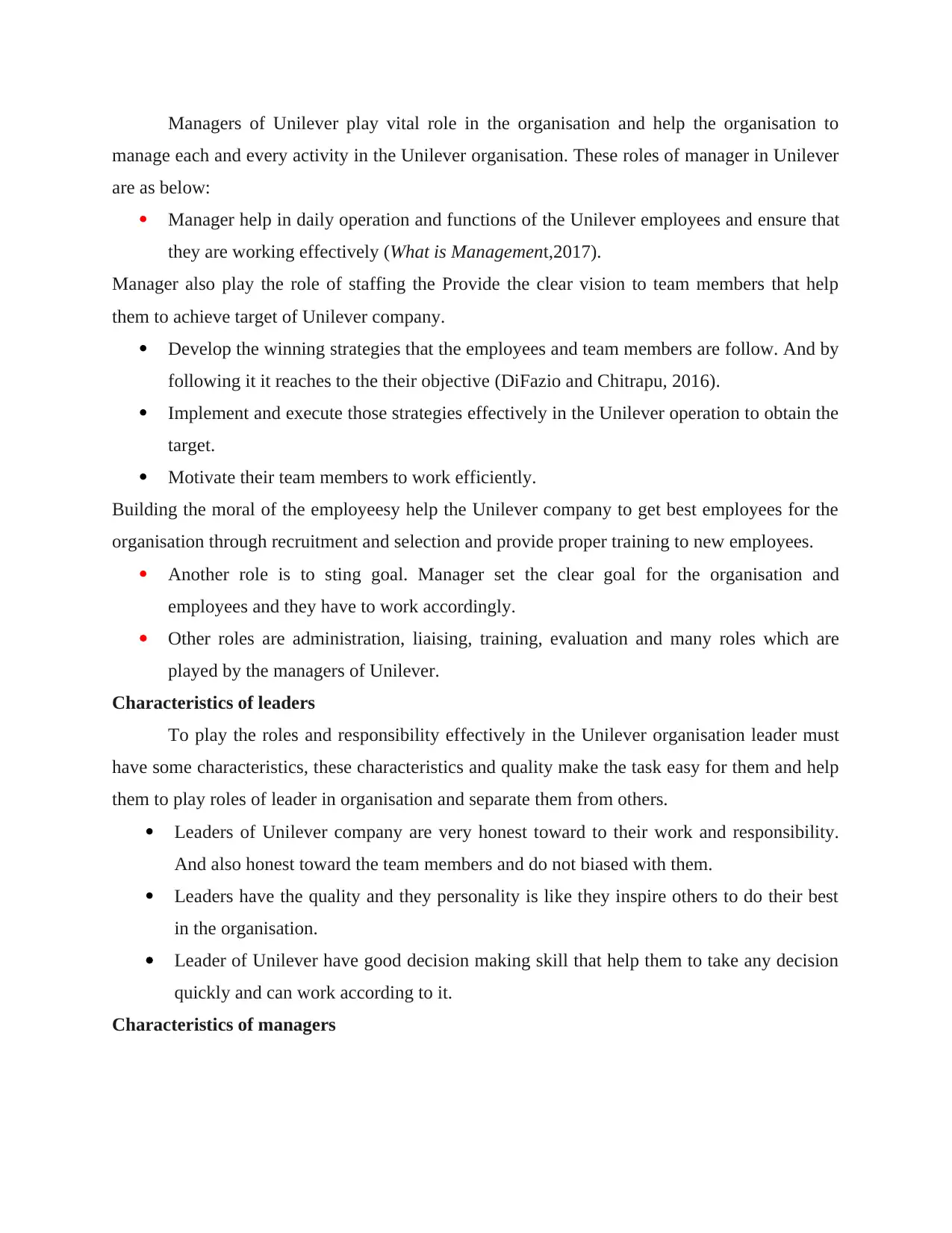
Managers of Unilever play vital role in the organisation and help the organisation to
manage each and every activity in the Unilever organisation. These roles of manager in Unilever
are as below:
Manager help in daily operation and functions of the Unilever employees and ensure that
they are working effectively (What is Management,2017).
Manager also play the role of staffing the Provide the clear vision to team members that help
them to achieve target of Unilever company.
Develop the winning strategies that the employees and team members are follow. And by
following it it reaches to the their objective (DiFazio and Chitrapu, 2016).
Implement and execute those strategies effectively in the Unilever operation to obtain the
target.
Motivate their team members to work efficiently.
Building the moral of the employeesy help the Unilever company to get best employees for the
organisation through recruitment and selection and provide proper training to new employees.
Another role is to sting goal. Manager set the clear goal for the organisation and
employees and they have to work accordingly.
Other roles are administration, liaising, training, evaluation and many roles which are
played by the managers of Unilever.
Characteristics of leaders
To play the roles and responsibility effectively in the Unilever organisation leader must
have some characteristics, these characteristics and quality make the task easy for them and help
them to play roles of leader in organisation and separate them from others.
Leaders of Unilever company are very honest toward to their work and responsibility.
And also honest toward the team members and do not biased with them.
Leaders have the quality and they personality is like they inspire others to do their best
in the organisation.
Leader of Unilever have good decision making skill that help them to take any decision
quickly and can work according to it.
Characteristics of managers
manage each and every activity in the Unilever organisation. These roles of manager in Unilever
are as below:
Manager help in daily operation and functions of the Unilever employees and ensure that
they are working effectively (What is Management,2017).
Manager also play the role of staffing the Provide the clear vision to team members that help
them to achieve target of Unilever company.
Develop the winning strategies that the employees and team members are follow. And by
following it it reaches to the their objective (DiFazio and Chitrapu, 2016).
Implement and execute those strategies effectively in the Unilever operation to obtain the
target.
Motivate their team members to work efficiently.
Building the moral of the employeesy help the Unilever company to get best employees for the
organisation through recruitment and selection and provide proper training to new employees.
Another role is to sting goal. Manager set the clear goal for the organisation and
employees and they have to work accordingly.
Other roles are administration, liaising, training, evaluation and many roles which are
played by the managers of Unilever.
Characteristics of leaders
To play the roles and responsibility effectively in the Unilever organisation leader must
have some characteristics, these characteristics and quality make the task easy for them and help
them to play roles of leader in organisation and separate them from others.
Leaders of Unilever company are very honest toward to their work and responsibility.
And also honest toward the team members and do not biased with them.
Leaders have the quality and they personality is like they inspire others to do their best
in the organisation.
Leader of Unilever have good decision making skill that help them to take any decision
quickly and can work according to it.
Characteristics of managers
Paraphrase This Document
Need a fresh take? Get an instant paraphrase of this document with our AI Paraphraser
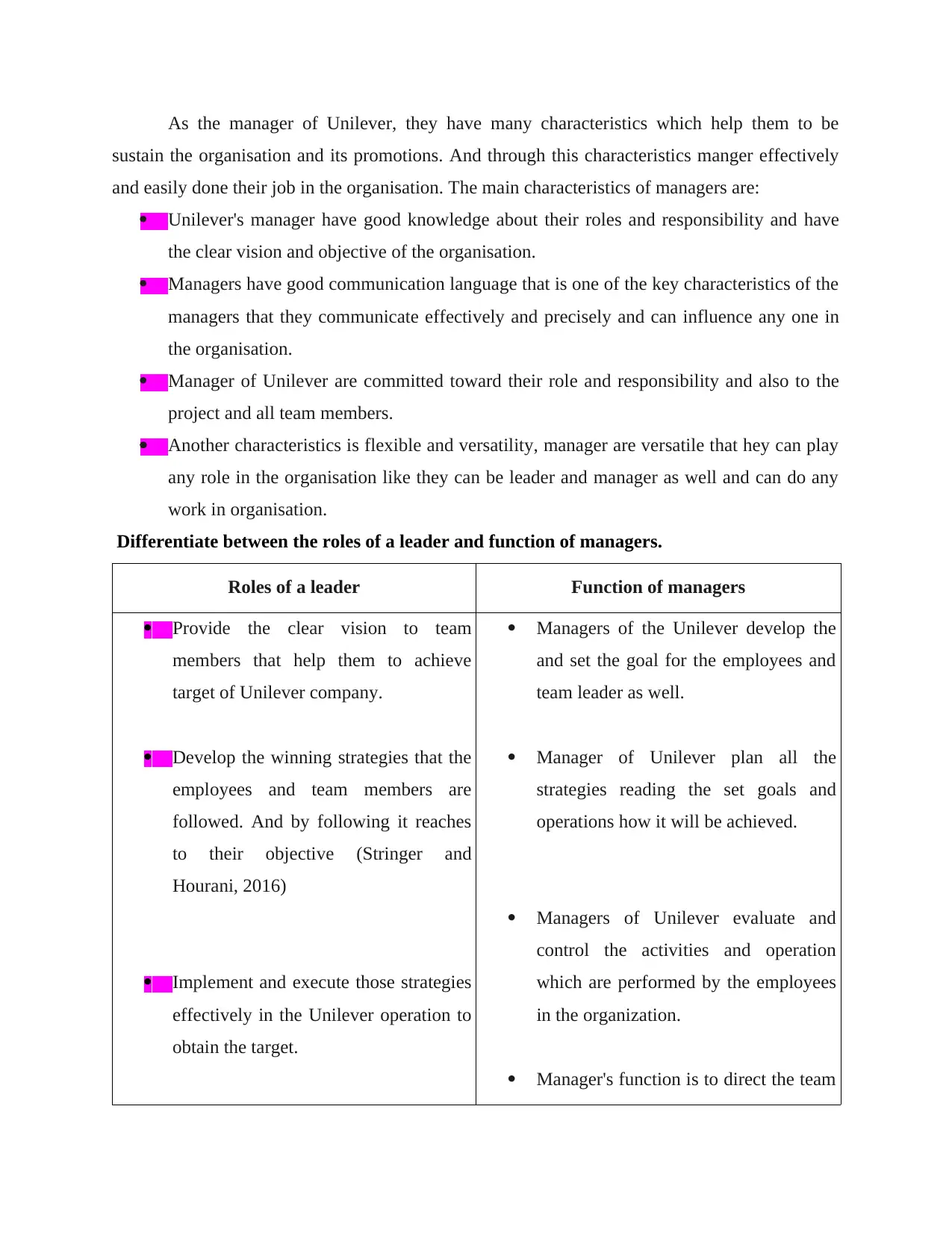
As the manager of Unilever, they have many characteristics which help them to be
sustain the organisation and its promotions. And through this characteristics manger effectively
and easily done their job in the organisation. The main characteristics of managers are:
Unilever's manager have good knowledge about their roles and responsibility and have
the clear vision and objective of the organisation.
Managers have good communication language that is one of the key characteristics of the
managers that they communicate effectively and precisely and can influence any one in
the organisation.
Manager of Unilever are committed toward their role and responsibility and also to the
project and all team members.
Another characteristics is flexible and versatility, manager are versatile that hey can play
any role in the organisation like they can be leader and manager as well and can do any
work in organisation.
Differentiate between the roles of a leader and function of managers.
Roles of a leader Function of managers
Provide the clear vision to team
members that help them to achieve
target of Unilever company.
Develop the winning strategies that the
employees and team members are
followed. And by following it reaches
to their objective (Stringer and
Hourani, 2016)
Implement and execute those strategies
effectively in the Unilever operation to
obtain the target.
Managers of the Unilever develop the
and set the goal for the employees and
team leader as well.
Manager of Unilever plan all the
strategies reading the set goals and
operations how it will be achieved.
Managers of Unilever evaluate and
control the activities and operation
which are performed by the employees
in the organization.
Manager's function is to direct the team
sustain the organisation and its promotions. And through this characteristics manger effectively
and easily done their job in the organisation. The main characteristics of managers are:
Unilever's manager have good knowledge about their roles and responsibility and have
the clear vision and objective of the organisation.
Managers have good communication language that is one of the key characteristics of the
managers that they communicate effectively and precisely and can influence any one in
the organisation.
Manager of Unilever are committed toward their role and responsibility and also to the
project and all team members.
Another characteristics is flexible and versatility, manager are versatile that hey can play
any role in the organisation like they can be leader and manager as well and can do any
work in organisation.
Differentiate between the roles of a leader and function of managers.
Roles of a leader Function of managers
Provide the clear vision to team
members that help them to achieve
target of Unilever company.
Develop the winning strategies that the
employees and team members are
followed. And by following it reaches
to their objective (Stringer and
Hourani, 2016)
Implement and execute those strategies
effectively in the Unilever operation to
obtain the target.
Managers of the Unilever develop the
and set the goal for the employees and
team leader as well.
Manager of Unilever plan all the
strategies reading the set goals and
operations how it will be achieved.
Managers of Unilever evaluate and
control the activities and operation
which are performed by the employees
in the organization.
Manager's function is to direct the team
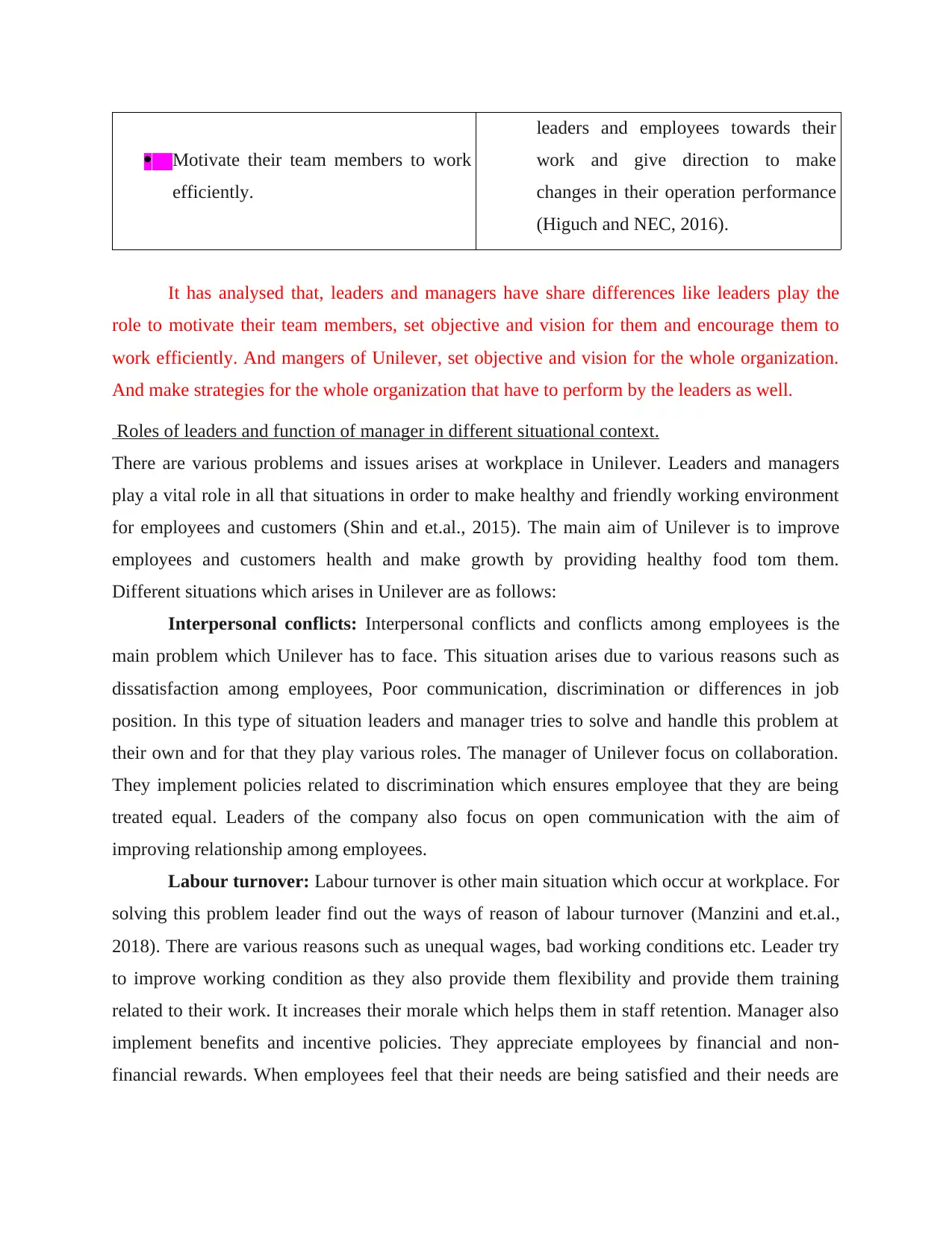
Motivate their team members to work
efficiently.
leaders and employees towards their
work and give direction to make
changes in their operation performance
(Higuch and NEC, 2016).
It has analysed that, leaders and managers have share differences like leaders play the
role to motivate their team members, set objective and vision for them and encourage them to
work efficiently. And mangers of Unilever, set objective and vision for the whole organization.
And make strategies for the whole organization that have to perform by the leaders as well.
Roles of leaders and function of manager in different situational context.
There are various problems and issues arises at workplace in Unilever. Leaders and managers
play a vital role in all that situations in order to make healthy and friendly working environment
for employees and customers (Shin and et.al., 2015). The main aim of Unilever is to improve
employees and customers health and make growth by providing healthy food tom them.
Different situations which arises in Unilever are as follows:
Interpersonal conflicts: Interpersonal conflicts and conflicts among employees is the
main problem which Unilever has to face. This situation arises due to various reasons such as
dissatisfaction among employees, Poor communication, discrimination or differences in job
position. In this type of situation leaders and manager tries to solve and handle this problem at
their own and for that they play various roles. The manager of Unilever focus on collaboration.
They implement policies related to discrimination which ensures employee that they are being
treated equal. Leaders of the company also focus on open communication with the aim of
improving relationship among employees.
Labour turnover: Labour turnover is other main situation which occur at workplace. For
solving this problem leader find out the ways of reason of labour turnover (Manzini and et.al.,
2018). There are various reasons such as unequal wages, bad working conditions etc. Leader try
to improve working condition as they also provide them flexibility and provide them training
related to their work. It increases their morale which helps them in staff retention. Manager also
implement benefits and incentive policies. They appreciate employees by financial and non-
financial rewards. When employees feel that their needs are being satisfied and their needs are
efficiently.
leaders and employees towards their
work and give direction to make
changes in their operation performance
(Higuch and NEC, 2016).
It has analysed that, leaders and managers have share differences like leaders play the
role to motivate their team members, set objective and vision for them and encourage them to
work efficiently. And mangers of Unilever, set objective and vision for the whole organization.
And make strategies for the whole organization that have to perform by the leaders as well.
Roles of leaders and function of manager in different situational context.
There are various problems and issues arises at workplace in Unilever. Leaders and managers
play a vital role in all that situations in order to make healthy and friendly working environment
for employees and customers (Shin and et.al., 2015). The main aim of Unilever is to improve
employees and customers health and make growth by providing healthy food tom them.
Different situations which arises in Unilever are as follows:
Interpersonal conflicts: Interpersonal conflicts and conflicts among employees is the
main problem which Unilever has to face. This situation arises due to various reasons such as
dissatisfaction among employees, Poor communication, discrimination or differences in job
position. In this type of situation leaders and manager tries to solve and handle this problem at
their own and for that they play various roles. The manager of Unilever focus on collaboration.
They implement policies related to discrimination which ensures employee that they are being
treated equal. Leaders of the company also focus on open communication with the aim of
improving relationship among employees.
Labour turnover: Labour turnover is other main situation which occur at workplace. For
solving this problem leader find out the ways of reason of labour turnover (Manzini and et.al.,
2018). There are various reasons such as unequal wages, bad working conditions etc. Leader try
to improve working condition as they also provide them flexibility and provide them training
related to their work. It increases their morale which helps them in staff retention. Manager also
implement benefits and incentive policies. They appreciate employees by financial and non-
financial rewards. When employees feel that their needs are being satisfied and their needs are
⊘ This is a preview!⊘
Do you want full access?
Subscribe today to unlock all pages.

Trusted by 1+ million students worldwide
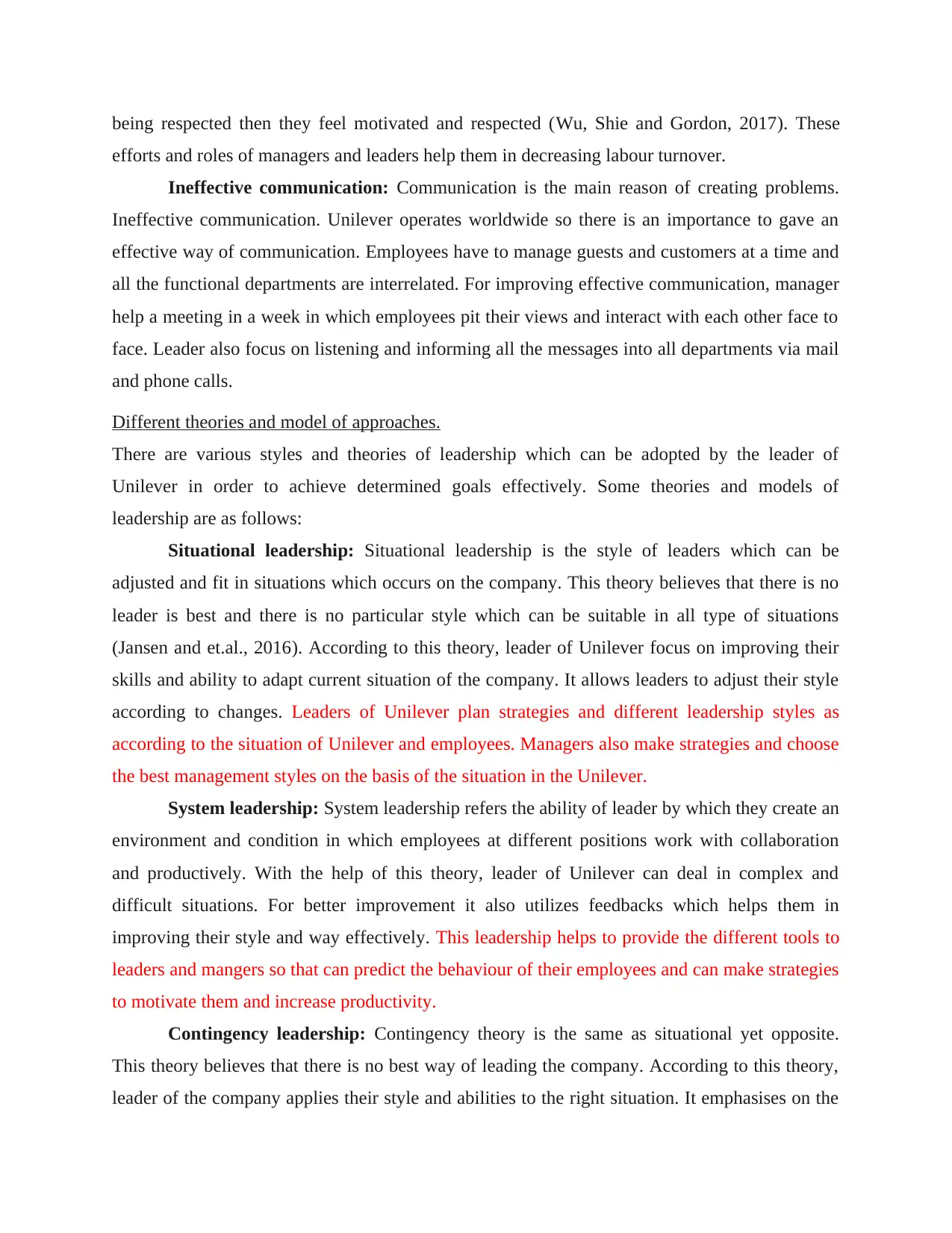
being respected then they feel motivated and respected (Wu, Shie and Gordon, 2017). These
efforts and roles of managers and leaders help them in decreasing labour turnover.
Ineffective communication: Communication is the main reason of creating problems.
Ineffective communication. Unilever operates worldwide so there is an importance to gave an
effective way of communication. Employees have to manage guests and customers at a time and
all the functional departments are interrelated. For improving effective communication, manager
help a meeting in a week in which employees pit their views and interact with each other face to
face. Leader also focus on listening and informing all the messages into all departments via mail
and phone calls.
Different theories and model of approaches.
There are various styles and theories of leadership which can be adopted by the leader of
Unilever in order to achieve determined goals effectively. Some theories and models of
leadership are as follows:
Situational leadership: Situational leadership is the style of leaders which can be
adjusted and fit in situations which occurs on the company. This theory believes that there is no
leader is best and there is no particular style which can be suitable in all type of situations
(Jansen and et.al., 2016). According to this theory, leader of Unilever focus on improving their
skills and ability to adapt current situation of the company. It allows leaders to adjust their style
according to changes. Leaders of Unilever plan strategies and different leadership styles as
according to the situation of Unilever and employees. Managers also make strategies and choose
the best management styles on the basis of the situation in the Unilever.
System leadership: System leadership refers the ability of leader by which they create an
environment and condition in which employees at different positions work with collaboration
and productively. With the help of this theory, leader of Unilever can deal in complex and
difficult situations. For better improvement it also utilizes feedbacks which helps them in
improving their style and way effectively. This leadership helps to provide the different tools to
leaders and mangers so that can predict the behaviour of their employees and can make strategies
to motivate them and increase productivity.
Contingency leadership: Contingency theory is the same as situational yet opposite.
This theory believes that there is no best way of leading the company. According to this theory,
leader of the company applies their style and abilities to the right situation. It emphasises on the
efforts and roles of managers and leaders help them in decreasing labour turnover.
Ineffective communication: Communication is the main reason of creating problems.
Ineffective communication. Unilever operates worldwide so there is an importance to gave an
effective way of communication. Employees have to manage guests and customers at a time and
all the functional departments are interrelated. For improving effective communication, manager
help a meeting in a week in which employees pit their views and interact with each other face to
face. Leader also focus on listening and informing all the messages into all departments via mail
and phone calls.
Different theories and model of approaches.
There are various styles and theories of leadership which can be adopted by the leader of
Unilever in order to achieve determined goals effectively. Some theories and models of
leadership are as follows:
Situational leadership: Situational leadership is the style of leaders which can be
adjusted and fit in situations which occurs on the company. This theory believes that there is no
leader is best and there is no particular style which can be suitable in all type of situations
(Jansen and et.al., 2016). According to this theory, leader of Unilever focus on improving their
skills and ability to adapt current situation of the company. It allows leaders to adjust their style
according to changes. Leaders of Unilever plan strategies and different leadership styles as
according to the situation of Unilever and employees. Managers also make strategies and choose
the best management styles on the basis of the situation in the Unilever.
System leadership: System leadership refers the ability of leader by which they create an
environment and condition in which employees at different positions work with collaboration
and productively. With the help of this theory, leader of Unilever can deal in complex and
difficult situations. For better improvement it also utilizes feedbacks which helps them in
improving their style and way effectively. This leadership helps to provide the different tools to
leaders and mangers so that can predict the behaviour of their employees and can make strategies
to motivate them and increase productivity.
Contingency leadership: Contingency theory is the same as situational yet opposite.
This theory believes that there is no best way of leading the company. According to this theory,
leader of the company applies their style and abilities to the right situation. It emphasises on the
Paraphrase This Document
Need a fresh take? Get an instant paraphrase of this document with our AI Paraphraser
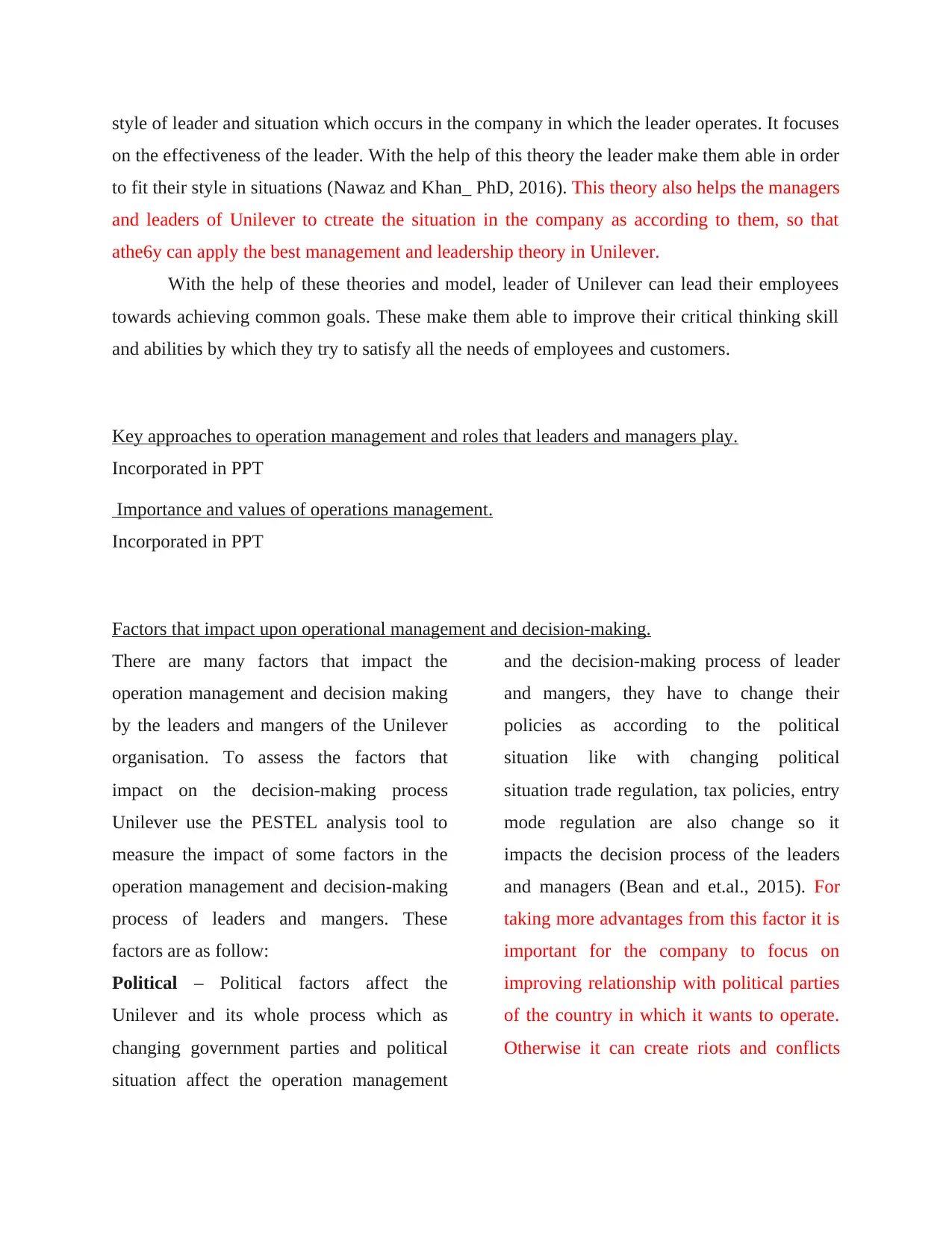
style of leader and situation which occurs in the company in which the leader operates. It focuses
on the effectiveness of the leader. With the help of this theory the leader make them able in order
to fit their style in situations (Nawaz and Khan_ PhD, 2016). This theory also helps the managers
and leaders of Unilever to ctreate the situation in the company as according to them, so that
athe6y can apply the best management and leadership theory in Unilever.
With the help of these theories and model, leader of Unilever can lead their employees
towards achieving common goals. These make them able to improve their critical thinking skill
and abilities by which they try to satisfy all the needs of employees and customers.
Key approaches to operation management and roles that leaders and managers play.
Incorporated in PPT
Importance and values of operations management.
Incorporated in PPT
Factors that impact upon operational management and decision-making.
There are many factors that impact the
operation management and decision making
by the leaders and mangers of the Unilever
organisation. To assess the factors that
impact on the decision-making process
Unilever use the PESTEL analysis tool to
measure the impact of some factors in the
operation management and decision-making
process of leaders and mangers. These
factors are as follow:
Political – Political factors affect the
Unilever and its whole process which as
changing government parties and political
situation affect the operation management
and the decision-making process of leader
and mangers, they have to change their
policies as according to the political
situation like with changing political
situation trade regulation, tax policies, entry
mode regulation are also change so it
impacts the decision process of the leaders
and managers (Bean and et.al., 2015). For
taking more advantages from this factor it is
important for the company to focus on
improving relationship with political parties
of the country in which it wants to operate.
Otherwise it can create riots and conflicts
on the effectiveness of the leader. With the help of this theory the leader make them able in order
to fit their style in situations (Nawaz and Khan_ PhD, 2016). This theory also helps the managers
and leaders of Unilever to ctreate the situation in the company as according to them, so that
athe6y can apply the best management and leadership theory in Unilever.
With the help of these theories and model, leader of Unilever can lead their employees
towards achieving common goals. These make them able to improve their critical thinking skill
and abilities by which they try to satisfy all the needs of employees and customers.
Key approaches to operation management and roles that leaders and managers play.
Incorporated in PPT
Importance and values of operations management.
Incorporated in PPT
Factors that impact upon operational management and decision-making.
There are many factors that impact the
operation management and decision making
by the leaders and mangers of the Unilever
organisation. To assess the factors that
impact on the decision-making process
Unilever use the PESTEL analysis tool to
measure the impact of some factors in the
operation management and decision-making
process of leaders and mangers. These
factors are as follow:
Political – Political factors affect the
Unilever and its whole process which as
changing government parties and political
situation affect the operation management
and the decision-making process of leader
and mangers, they have to change their
policies as according to the political
situation like with changing political
situation trade regulation, tax policies, entry
mode regulation are also change so it
impacts the decision process of the leaders
and managers (Bean and et.al., 2015). For
taking more advantages from this factor it is
important for the company to focus on
improving relationship with political parties
of the country in which it wants to operate.
Otherwise it can create riots and conflicts
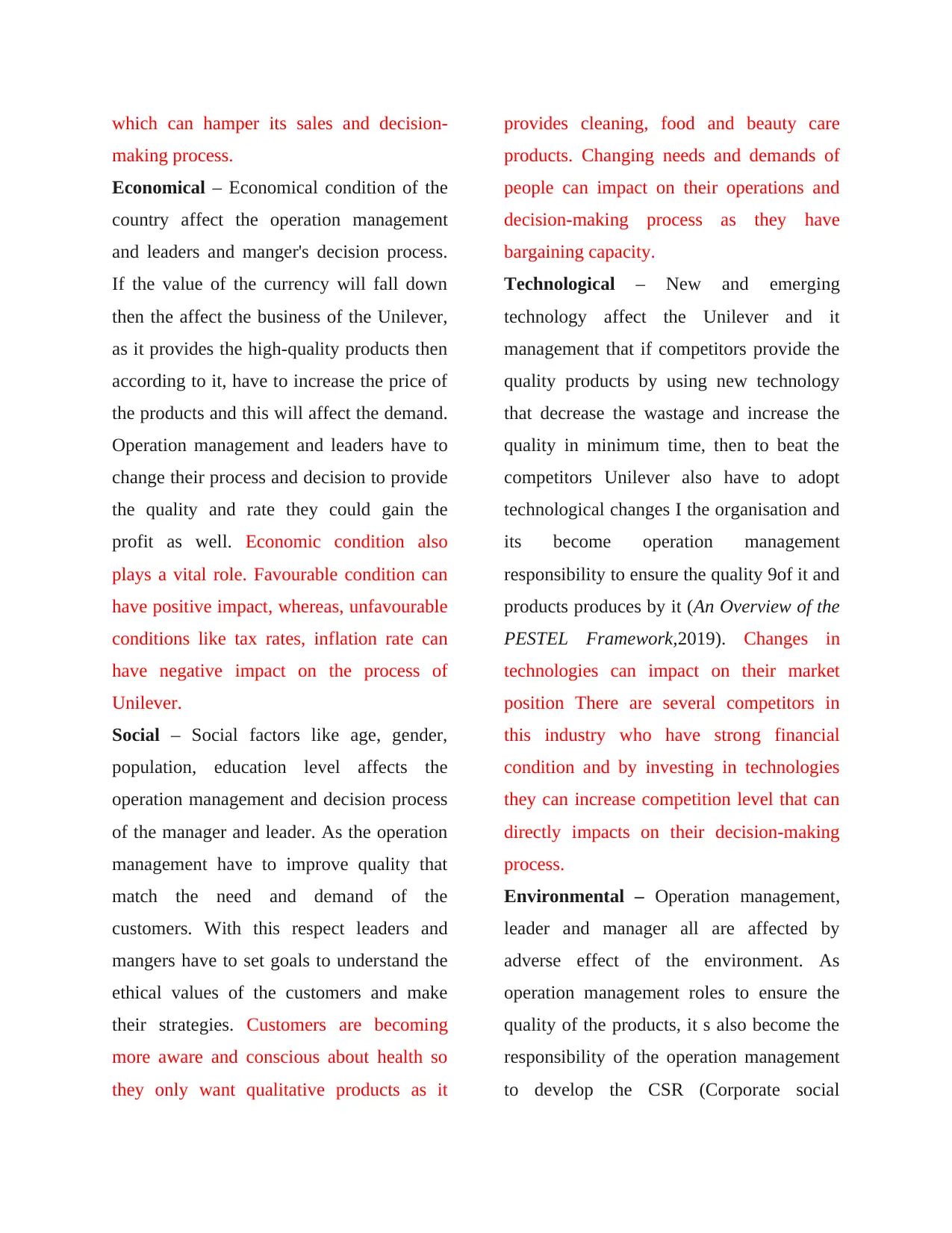
which can hamper its sales and decision-
making process.
Economical – Economical condition of the
country affect the operation management
and leaders and manger's decision process.
If the value of the currency will fall down
then the affect the business of the Unilever,
as it provides the high-quality products then
according to it, have to increase the price of
the products and this will affect the demand.
Operation management and leaders have to
change their process and decision to provide
the quality and rate they could gain the
profit as well. Economic condition also
plays a vital role. Favourable condition can
have positive impact, whereas, unfavourable
conditions like tax rates, inflation rate can
have negative impact on the process of
Unilever.
Social – Social factors like age, gender,
population, education level affects the
operation management and decision process
of the manager and leader. As the operation
management have to improve quality that
match the need and demand of the
customers. With this respect leaders and
mangers have to set goals to understand the
ethical values of the customers and make
their strategies. Customers are becoming
more aware and conscious about health so
they only want qualitative products as it
provides cleaning, food and beauty care
products. Changing needs and demands of
people can impact on their operations and
decision-making process as they have
bargaining capacity.
Technological – New and emerging
technology affect the Unilever and it
management that if competitors provide the
quality products by using new technology
that decrease the wastage and increase the
quality in minimum time, then to beat the
competitors Unilever also have to adopt
technological changes I the organisation and
its become operation management
responsibility to ensure the quality 9of it and
products produces by it (An Overview of the
PESTEL Framework,2019). Changes in
technologies can impact on their market
position There are several competitors in
this industry who have strong financial
condition and by investing in technologies
they can increase competition level that can
directly impacts on their decision-making
process.
Environmental – Operation management,
leader and manager all are affected by
adverse effect of the environment. As
operation management roles to ensure the
quality of the products, it s also become the
responsibility of the operation management
to develop the CSR (Corporate social
making process.
Economical – Economical condition of the
country affect the operation management
and leaders and manger's decision process.
If the value of the currency will fall down
then the affect the business of the Unilever,
as it provides the high-quality products then
according to it, have to increase the price of
the products and this will affect the demand.
Operation management and leaders have to
change their process and decision to provide
the quality and rate they could gain the
profit as well. Economic condition also
plays a vital role. Favourable condition can
have positive impact, whereas, unfavourable
conditions like tax rates, inflation rate can
have negative impact on the process of
Unilever.
Social – Social factors like age, gender,
population, education level affects the
operation management and decision process
of the manager and leader. As the operation
management have to improve quality that
match the need and demand of the
customers. With this respect leaders and
mangers have to set goals to understand the
ethical values of the customers and make
their strategies. Customers are becoming
more aware and conscious about health so
they only want qualitative products as it
provides cleaning, food and beauty care
products. Changing needs and demands of
people can impact on their operations and
decision-making process as they have
bargaining capacity.
Technological – New and emerging
technology affect the Unilever and it
management that if competitors provide the
quality products by using new technology
that decrease the wastage and increase the
quality in minimum time, then to beat the
competitors Unilever also have to adopt
technological changes I the organisation and
its become operation management
responsibility to ensure the quality 9of it and
products produces by it (An Overview of the
PESTEL Framework,2019). Changes in
technologies can impact on their market
position There are several competitors in
this industry who have strong financial
condition and by investing in technologies
they can increase competition level that can
directly impacts on their decision-making
process.
Environmental – Operation management,
leader and manager all are affected by
adverse effect of the environment. As
operation management roles to ensure the
quality of the products, it s also become the
responsibility of the operation management
to develop the CSR (Corporate social
⊘ This is a preview!⊘
Do you want full access?
Subscribe today to unlock all pages.

Trusted by 1+ million students worldwide
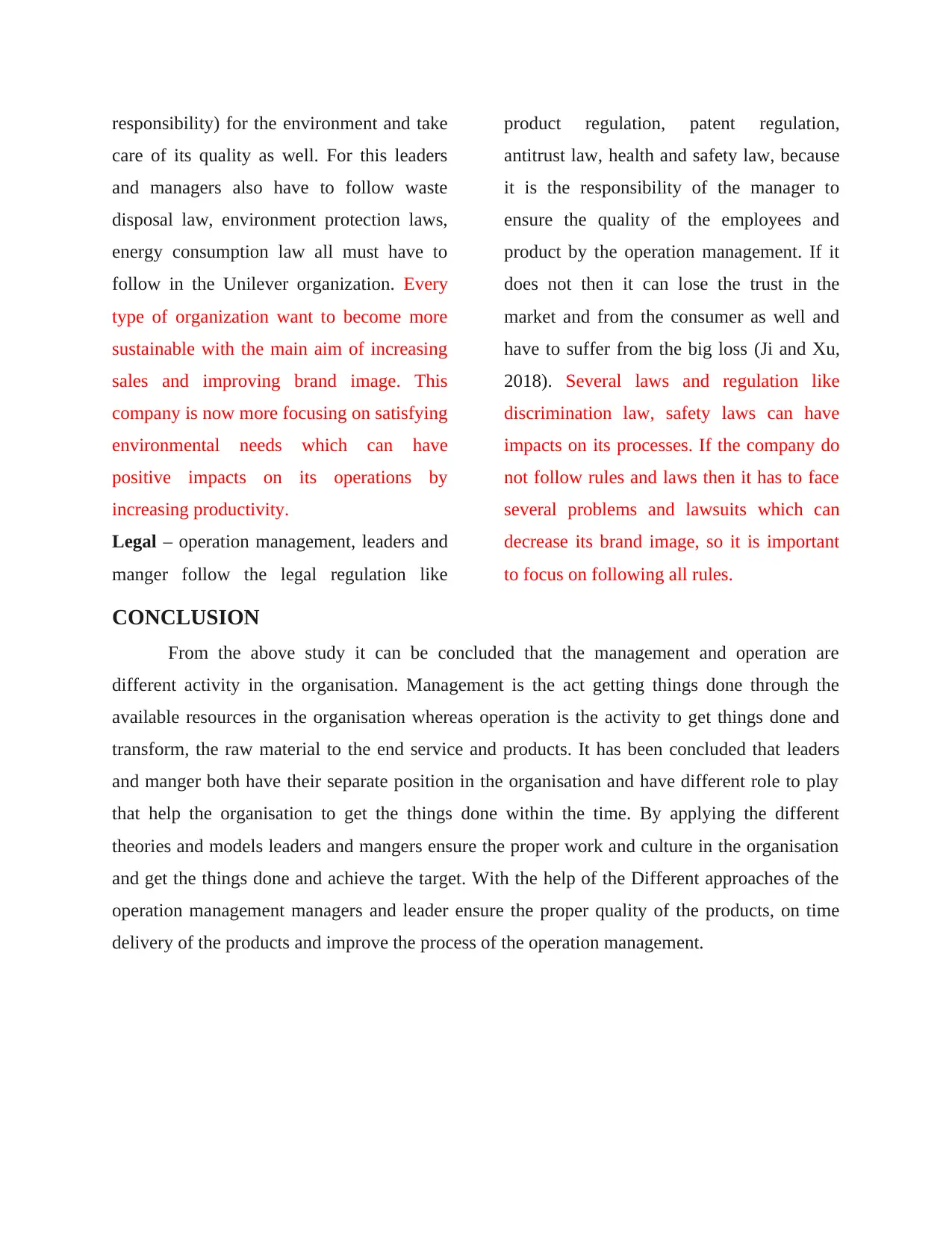
responsibility) for the environment and take
care of its quality as well. For this leaders
and managers also have to follow waste
disposal law, environment protection laws,
energy consumption law all must have to
follow in the Unilever organization. Every
type of organization want to become more
sustainable with the main aim of increasing
sales and improving brand image. This
company is now more focusing on satisfying
environmental needs which can have
positive impacts on its operations by
increasing productivity.
Legal – operation management, leaders and
manger follow the legal regulation like
product regulation, patent regulation,
antitrust law, health and safety law, because
it is the responsibility of the manager to
ensure the quality of the employees and
product by the operation management. If it
does not then it can lose the trust in the
market and from the consumer as well and
have to suffer from the big loss (Ji and Xu,
2018). Several laws and regulation like
discrimination law, safety laws can have
impacts on its processes. If the company do
not follow rules and laws then it has to face
several problems and lawsuits which can
decrease its brand image, so it is important
to focus on following all rules.
CONCLUSION
From the above study it can be concluded that the management and operation are
different activity in the organisation. Management is the act getting things done through the
available resources in the organisation whereas operation is the activity to get things done and
transform, the raw material to the end service and products. It has been concluded that leaders
and manger both have their separate position in the organisation and have different role to play
that help the organisation to get the things done within the time. By applying the different
theories and models leaders and mangers ensure the proper work and culture in the organisation
and get the things done and achieve the target. With the help of the Different approaches of the
operation management managers and leader ensure the proper quality of the products, on time
delivery of the products and improve the process of the operation management.
care of its quality as well. For this leaders
and managers also have to follow waste
disposal law, environment protection laws,
energy consumption law all must have to
follow in the Unilever organization. Every
type of organization want to become more
sustainable with the main aim of increasing
sales and improving brand image. This
company is now more focusing on satisfying
environmental needs which can have
positive impacts on its operations by
increasing productivity.
Legal – operation management, leaders and
manger follow the legal regulation like
product regulation, patent regulation,
antitrust law, health and safety law, because
it is the responsibility of the manager to
ensure the quality of the employees and
product by the operation management. If it
does not then it can lose the trust in the
market and from the consumer as well and
have to suffer from the big loss (Ji and Xu,
2018). Several laws and regulation like
discrimination law, safety laws can have
impacts on its processes. If the company do
not follow rules and laws then it has to face
several problems and lawsuits which can
decrease its brand image, so it is important
to focus on following all rules.
CONCLUSION
From the above study it can be concluded that the management and operation are
different activity in the organisation. Management is the act getting things done through the
available resources in the organisation whereas operation is the activity to get things done and
transform, the raw material to the end service and products. It has been concluded that leaders
and manger both have their separate position in the organisation and have different role to play
that help the organisation to get the things done within the time. By applying the different
theories and models leaders and mangers ensure the proper work and culture in the organisation
and get the things done and achieve the target. With the help of the Different approaches of the
operation management managers and leader ensure the proper quality of the products, on time
delivery of the products and improve the process of the operation management.
Paraphrase This Document
Need a fresh take? Get an instant paraphrase of this document with our AI Paraphraser
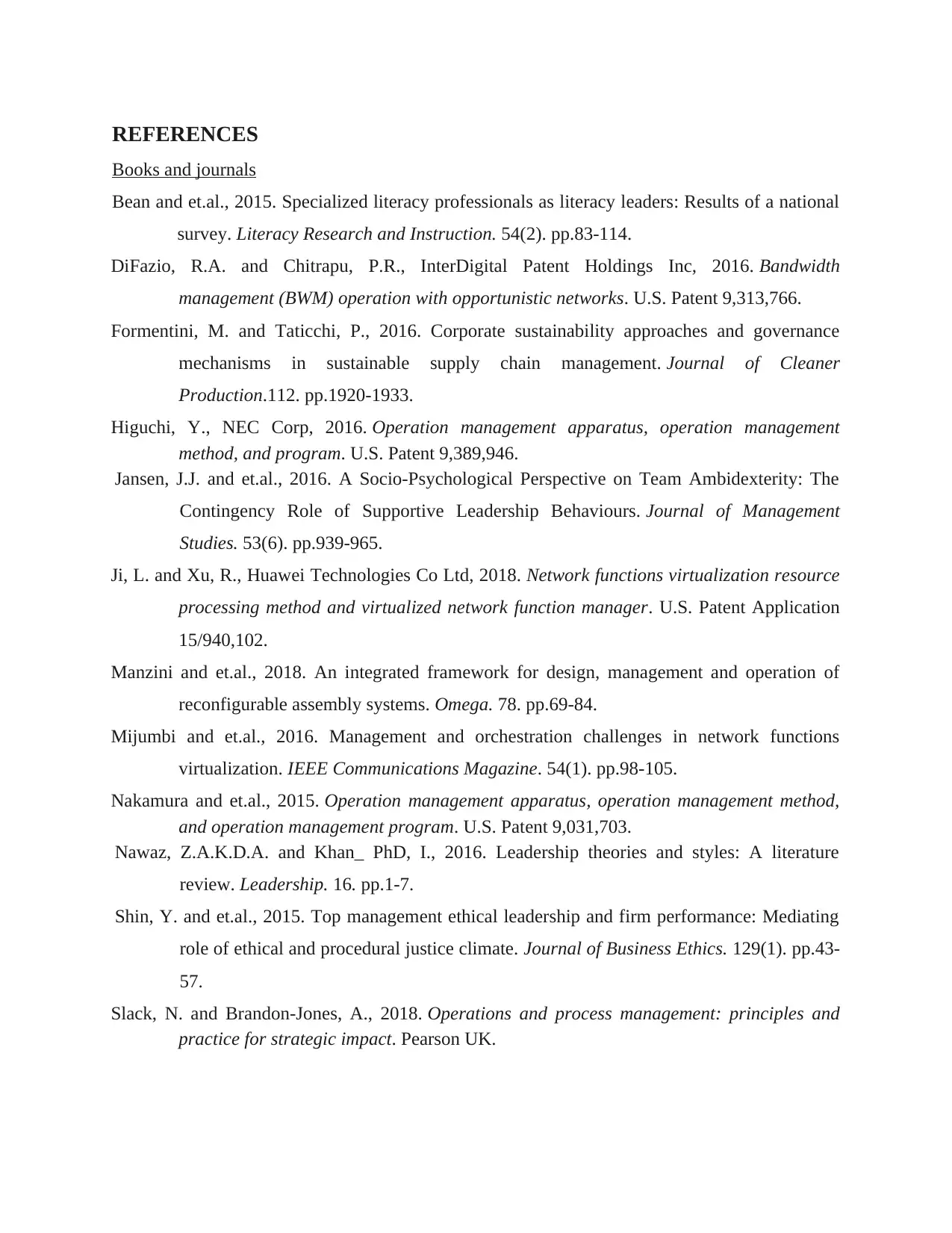
REFERENCES
Books and journals
Bean and et.al., 2015. Specialized literacy professionals as literacy leaders: Results of a national
survey. Literacy Research and Instruction. 54(2). pp.83-114.
DiFazio, R.A. and Chitrapu, P.R., InterDigital Patent Holdings Inc, 2016. Bandwidth
management (BWM) operation with opportunistic networks. U.S. Patent 9,313,766.
Formentini, M. and Taticchi, P., 2016. Corporate sustainability approaches and governance
mechanisms in sustainable supply chain management. Journal of Cleaner
Production.112. pp.1920-1933.
Higuchi, Y., NEC Corp, 2016. Operation management apparatus, operation management
method, and program. U.S. Patent 9,389,946.
Jansen, J.J. and et.al., 2016. A Socio‐Psychological Perspective on Team Ambidexterity: The
Contingency Role of Supportive Leadership Behaviours. Journal of Management
Studies. 53(6). pp.939-965.
Ji, L. and Xu, R., Huawei Technologies Co Ltd, 2018. Network functions virtualization resource
processing method and virtualized network function manager. U.S. Patent Application
15/940,102.
Manzini and et.al., 2018. An integrated framework for design, management and operation of
reconfigurable assembly systems. Omega. 78. pp.69-84.
Mijumbi and et.al., 2016. Management and orchestration challenges in network functions
virtualization. IEEE Communications Magazine. 54(1). pp.98-105.
Nakamura and et.al., 2015. Operation management apparatus, operation management method,
and operation management program. U.S. Patent 9,031,703.
Nawaz, Z.A.K.D.A. and Khan_ PhD, I., 2016. Leadership theories and styles: A literature
review. Leadership. 16. pp.1-7.
Shin, Y. and et.al., 2015. Top management ethical leadership and firm performance: Mediating
role of ethical and procedural justice climate. Journal of Business Ethics. 129(1). pp.43-
57.
Slack, N. and Brandon-Jones, A., 2018. Operations and process management: principles and
practice for strategic impact. Pearson UK.
Books and journals
Bean and et.al., 2015. Specialized literacy professionals as literacy leaders: Results of a national
survey. Literacy Research and Instruction. 54(2). pp.83-114.
DiFazio, R.A. and Chitrapu, P.R., InterDigital Patent Holdings Inc, 2016. Bandwidth
management (BWM) operation with opportunistic networks. U.S. Patent 9,313,766.
Formentini, M. and Taticchi, P., 2016. Corporate sustainability approaches and governance
mechanisms in sustainable supply chain management. Journal of Cleaner
Production.112. pp.1920-1933.
Higuchi, Y., NEC Corp, 2016. Operation management apparatus, operation management
method, and program. U.S. Patent 9,389,946.
Jansen, J.J. and et.al., 2016. A Socio‐Psychological Perspective on Team Ambidexterity: The
Contingency Role of Supportive Leadership Behaviours. Journal of Management
Studies. 53(6). pp.939-965.
Ji, L. and Xu, R., Huawei Technologies Co Ltd, 2018. Network functions virtualization resource
processing method and virtualized network function manager. U.S. Patent Application
15/940,102.
Manzini and et.al., 2018. An integrated framework for design, management and operation of
reconfigurable assembly systems. Omega. 78. pp.69-84.
Mijumbi and et.al., 2016. Management and orchestration challenges in network functions
virtualization. IEEE Communications Magazine. 54(1). pp.98-105.
Nakamura and et.al., 2015. Operation management apparatus, operation management method,
and operation management program. U.S. Patent 9,031,703.
Nawaz, Z.A.K.D.A. and Khan_ PhD, I., 2016. Leadership theories and styles: A literature
review. Leadership. 16. pp.1-7.
Shin, Y. and et.al., 2015. Top management ethical leadership and firm performance: Mediating
role of ethical and procedural justice climate. Journal of Business Ethics. 129(1). pp.43-
57.
Slack, N. and Brandon-Jones, A., 2018. Operations and process management: principles and
practice for strategic impact. Pearson UK.
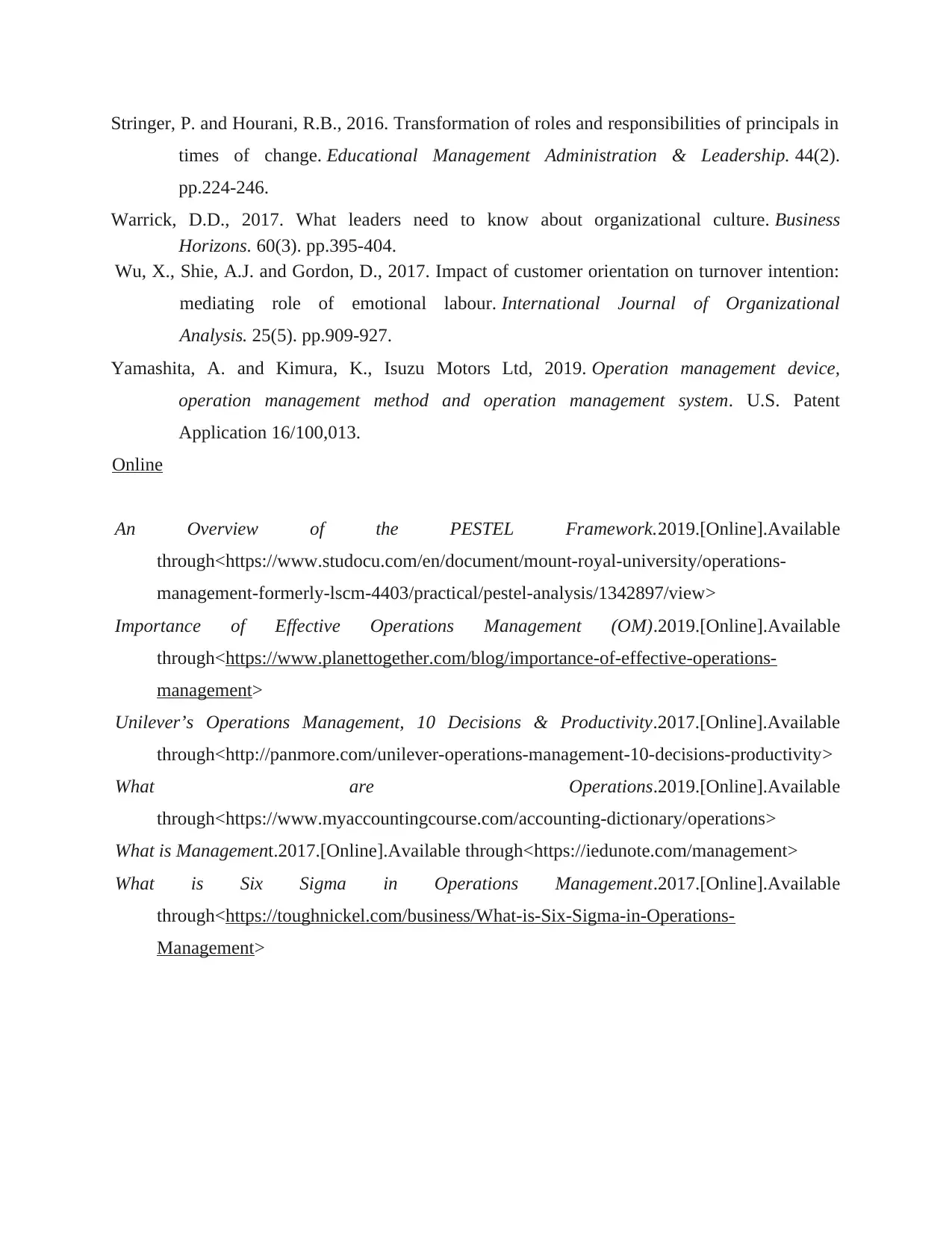
Stringer, P. and Hourani, R.B., 2016. Transformation of roles and responsibilities of principals in
times of change. Educational Management Administration & Leadership. 44(2).
pp.224-246.
Warrick, D.D., 2017. What leaders need to know about organizational culture. Business
Horizons. 60(3). pp.395-404.
Wu, X., Shie, A.J. and Gordon, D., 2017. Impact of customer orientation on turnover intention:
mediating role of emotional labour. International Journal of Organizational
Analysis. 25(5). pp.909-927.
Yamashita, A. and Kimura, K., Isuzu Motors Ltd, 2019. Operation management device,
operation management method and operation management system. U.S. Patent
Application 16/100,013.
Online
An Overview of the PESTEL Framework.2019.[Online].Available
through<https://www.studocu.com/en/document/mount-royal-university/operations-
management-formerly-lscm-4403/practical/pestel-analysis/1342897/view>
Importance of Effective Operations Management (OM).2019.[Online].Available
through<https://www.planettogether.com/blog/importance-of-effective-operations-
management>
Unilever’s Operations Management, 10 Decisions & Productivity.2017.[Online].Available
through<http://panmore.com/unilever-operations-management-10-decisions-productivity>
What are Operations.2019.[Online].Available
through<https://www.myaccountingcourse.com/accounting-dictionary/operations>
What is Management.2017.[Online].Available through<https://iedunote.com/management>
What is Six Sigma in Operations Management.2017.[Online].Available
through<https://toughnickel.com/business/What-is-Six-Sigma-in-Operations-
Management>
times of change. Educational Management Administration & Leadership. 44(2).
pp.224-246.
Warrick, D.D., 2017. What leaders need to know about organizational culture. Business
Horizons. 60(3). pp.395-404.
Wu, X., Shie, A.J. and Gordon, D., 2017. Impact of customer orientation on turnover intention:
mediating role of emotional labour. International Journal of Organizational
Analysis. 25(5). pp.909-927.
Yamashita, A. and Kimura, K., Isuzu Motors Ltd, 2019. Operation management device,
operation management method and operation management system. U.S. Patent
Application 16/100,013.
Online
An Overview of the PESTEL Framework.2019.[Online].Available
through<https://www.studocu.com/en/document/mount-royal-university/operations-
management-formerly-lscm-4403/practical/pestel-analysis/1342897/view>
Importance of Effective Operations Management (OM).2019.[Online].Available
through<https://www.planettogether.com/blog/importance-of-effective-operations-
management>
Unilever’s Operations Management, 10 Decisions & Productivity.2017.[Online].Available
through<http://panmore.com/unilever-operations-management-10-decisions-productivity>
What are Operations.2019.[Online].Available
through<https://www.myaccountingcourse.com/accounting-dictionary/operations>
What is Management.2017.[Online].Available through<https://iedunote.com/management>
What is Six Sigma in Operations Management.2017.[Online].Available
through<https://toughnickel.com/business/What-is-Six-Sigma-in-Operations-
Management>
⊘ This is a preview!⊘
Do you want full access?
Subscribe today to unlock all pages.

Trusted by 1+ million students worldwide
1 out of 12
Related Documents
Your All-in-One AI-Powered Toolkit for Academic Success.
+13062052269
info@desklib.com
Available 24*7 on WhatsApp / Email
![[object Object]](/_next/static/media/star-bottom.7253800d.svg)
Unlock your academic potential
Copyright © 2020–2026 A2Z Services. All Rights Reserved. Developed and managed by ZUCOL.





